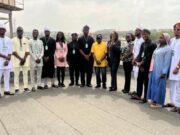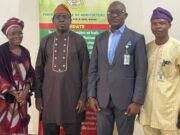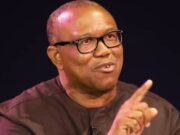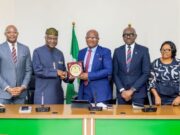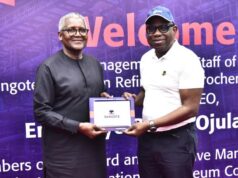
Shell Petroleum Development Company of Nigeria Limited (SPDC) has outlined re-orientating the thinking of undergraduates in Nigerian universities as one of the critical actions to challenge them on the use of emerging technologies to enable innovation and allow Nigeria to actualize the National Association of Petroleum Explorationists’ (NAPE) 37th Annual International Conference and Exhibition’s aspiration of expanding Nigeria’s petroleum landscape through digitalization, innovation and emerging technologies.
Country Chairman of Shell Companies in Nigeria, and Managing Director, SPDC, Mr. Osagie Okunbor, said, “Shell has collaborations with the academia in Nigeria and now has two successful centres of excellence that promote the emergence of industry-ready graduates at university level.”
Osagie told the NAPE conference (which included the GMD, NNPC, Mallam Mele Kyari), in Lagos, that the Centre of Excellence in Geosciences and Petroleum Engineering at the University of Benin established in 2012, the Rivers State University Centre of Excellence in Marine and Offshore Engineering established in 2017, along with SPDC’s six Professorial Chairs and the Sabbatical & Internship programmes in key areas, grow skills within Nigerian universities for the industry.
Okunbor (represented by Shell General Manager, Exploration, Mr. Dan Agbaire) said, “Every year, since 1980, 10 Nigerian professors and 25 research interns commence one-year research programmes in SPDC and share their findings with SPDC in fields such as biodiversity, petroleum engineering, geophysics, impact assessment, community health and oil and gas exploration, contributing to providing critical industry input into higher education in Nigeria.”
He described these programmes as examples of necessary steps to enable the NAPE aspiration of expanding Nigeria’s petroleum landscape through digitalization, innovation and emerging technologies.
Okunbor called for the right investment climate, to enable the expansion of Nigeria’s petroleum landscape and enable the increase of Nigeria’s oil production from the current average of 2.3 million b/d to 3 million b/d and boost the country’s proven oil reserves to about 40 billion barrels through further exploration and appraisal.
He said, “The right investment climate would also include strengthening our regulatory bodies, giving priorities to research and further enabling the industry’s financials. I believe that where the investment climate is right, digitalization and deployment of emerging technologies will enable incremental value creation over the coming years.”
“I believe that if we appropriately apply the valuable information and lessons from this conference, our industry will experience a giant leap in transformation. It will support our aspiration of expanding Nigeria’s petroleum landscape, he said.”
“In Shell, digitalization is more than technology. It is also about people and ensuring more agile ways of working”, he continued. “We employ leading data scientists who unlock value from the vast amounts of data that Shell has access to in a responsible manner whilst maintaining customer trust.”
“Across all our businesses, we look for opportunities where we can replicate and use this at any scale. We look to use applicable standard technologies (unless there is a competitive advantage to building proprietary solutions) to change the way we search for and produce oil and gas, design wells, provide energy, or buy goods and services”, he said.
Okunbor said the use of advanced infrastructure and partnership with some of the world’s biggest cloud providers, give the company the capacity for powerful data analytics.
He said, “We are leaders in deploying artificial intelligence and are using it in areas ranging from seismic analysis to drilling and predictive maintenance. All of these we do because we know that digitalization has a big role in delivering all our strategic goals.”
“We can do more. The industry can do more. This future is more in our hands than we think”, he said.
Packaged by Alice Egbedele










